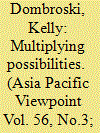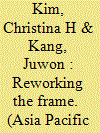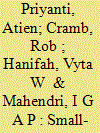|
|
|
Sort Order |
|
|
|
Items / Page
|
|
|
|
|
|
|
| Srl | Item |
| 1 |
ID:
142640


|
|
|
|
|
| Summary/Abstract |
The Sustainable Livelihoods Approach (SLA) is promoted as a useful way to centre development on the needs of those who are most vulnerable, but is critiqued for inflexibility and ignoring important power relations. In light of the rigidities in using a formulaic SLA, this conceptual paper suggests a practical suite of tools that are in use in livelihoods research and development practice, and refocuses them to include adaptive strategies of vulnerable peoples to resource management pressures. The Pentagon Prison of five capitals can overwhelm both the researcher and researched and while possibly useful in identifying livelihoods gaps, misses all-encompassing power relations, and reduces complexities to quantitative units. In arguing for a shift from the Pentagon Prison of SLA towards a flexible livelihoods trajectory approach, in particular for a research project on livelihood adaptations in Lao PDR, I identify a feasible research and development approach that more meaningfully reflects the lives of those participating in that research. I propose that the livelihood trajectories approach opens up the way data are gathered and can lead to holistic understandings of the complex realities of peoples' adaptive strategies, incorporating strategies from short to long term, and proactive, reactive and inactive techniques.
|
|
|
|
|
|
|
|
|
|
|
|
|
|
|
|
| 2 |
ID:
142639


|
|
|
|
|
| Summary/Abstract |
Yolŋu people living in northeast Arnhem Land regularly celebrate their connections with the Macassan trepangers from Indonesian Sulawesi in storytelling, art and music. The history of this contact is well known in academic literature, and these stories of Macassan contact are told regularly by Yolŋu people to tourists visiting northeast Arnhem Land. This paper explores the impact that hearing stories about the Macassans from one Yolŋu family's tourism business had on a group of Australian Indonesian language teachers, visiting as part of an Endeavour Language Teaching Fellowship. It draws on ideas related to telling and hearing stories and argues that these particular stories enabled the teachers to make powerful connections: with each other and with Australia's histories and geographies. The paper also explores the ways in which the teachers went on to become storytellers themselves, using stories to make connections in their students' learning.
|
|
|
|
|
|
|
|
|
|
|
|
|
|
|
|
| 3 |
ID:
142636


|
|
|
|
|
| Summary/Abstract |
Postdevelopment thinkers and writers have critiqued development discourse for its role in perpetuating inequality. In water, sanitation and hygiene (WASH) literature and interventions, the discourse used perpetuates inequality through classing anything other than private toilets as ‘without sanitation’. This implies that the people who use forms of hygiene and sanitation relying on collective toilets and alternative strategies are somehow unhygienic. Yet residents of Xining (Qinghai Province, China) rely on hygiene assemblages that do not always include private toilets, but nonetheless still work to guard health for families with young children. In this paper, I develop a postdevelopment approach to hygiene and sanitation starting with the place-based hygiene realities already working to guard health in some way, then working to multiply possibilities for future discursive and material hygiene realities.
|
|
|
|
|
|
|
|
|
|
|
|
|
|
|
|
| 4 |
ID:
142638


|
|
|
|
|
| Summary/Abstract |
This paper argues that Korea, once a representative East Asian developmental state, has state characteristics that amount to ‘neoliberal developmentalism’, which is a combination of the government's neoliberal political rationality and the developmental state's governmentality. To elucidate this, the case of Korea's recent green growth policymaking process is analysed. The government based the policy on its neoliberal political rationality. This featured the utilisation of neoliberalism to achieve the government's specific aims in the international, political and socio-economic spheres. Furthermore, the government revealed the developmental state's governmentality, focusing on the maintenance of the developmental state's policy autonomy and capacity. Based on the findings, this paper teases out the academic implications of the post-developmental state and the policy implications regarding policymaking in the context of neoliberal developmentalism.
|
|
|
|
|
|
|
|
|
|
|
|
|
|
|
|
| 5 |
ID:
142641


|
|
|
|
|
| Summary/Abstract |
North Korea remains a place of obscurity, mystery and even of imminent threat in popular imagination of East Asia and America. In this article, we explore existing representations of and discourses around North Korea and argue for a different framework to consider how North Korea is a critical participant in the contemporary world. Drawing on our respective fieldwork in Dandong, China, throughout 2006 to 2014, the article suggests a new way of thinking about issues surrounding North Korea.
|
|
|
|
|
|
|
|
|
|
|
|
|
|
|
|
| 6 |
ID:
142637


|
|
|
|
|
| Summary/Abstract |
Despite its small area and intensively cropped landscape, East Java accounts for 30% of Indonesia's cattle population. About two million households draw on family labour to raise cattle in backyard sheds and small enclosures, largely for cash income. In this paper, we examine the opportunity for such small-scale producers to benefit from Indonesia's economic transformation, given the rising urban demand for beef. The paper reports on a study in two contrasting sites in East Java – irrigated lowlands and rainfed uplands – to explore the constraints facing small-scale cattle producers in these environments, the means by which they have adapted to these constraints (especially by going beyond the farm household to access feed supplies) and possible means to enhance their production systems and incomes. The findings suggest that such cattle production systems can provide a viable source of livelihood, even for resource-poor households; hence, appropriately adapted cattle improvement programmes are a sensible component of a pro-poor development strategy.
|
|
|
|
|
|
|
|
|
|
|
|
|
|
|
|
|
|
|
|
|